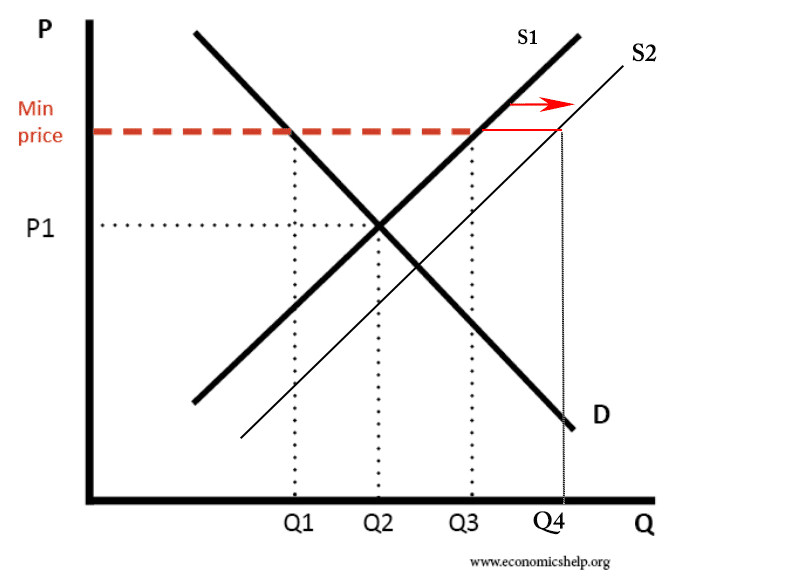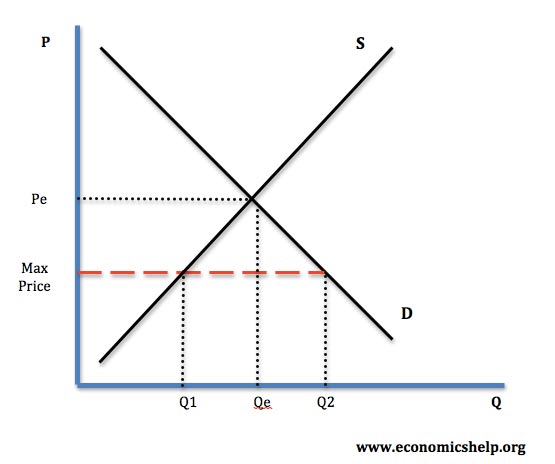The law of unintended consequences refers to how economic decisions may have effects that are unexpected. Usually, this refers to an economic law which distorts consumer or producer behaviour in a way that is not expected.
For example, a law may be implemented with the best intentions to help a group, but, if there are unintended consequences, they could end up being worse off.
Examples of Unintended Consequences
- After Exxon Valdes oil spill many US coastal state enacted a law of placing unlimited liability on tanker spills. This led to many big oil companies subcontracting the delivery of oil to other companies. Oil specialists worried that these smaller companies may have lower standards and poorer insurance than the big companies, so actually the risk increased.
- Another example is the maximum price for renting accommodation. A government may respond to public pressure and impose maximum rent levels for accommodation in London. But, a maximum price which lowers the price could lead to less incentive for landlords to supply accommodation. Therefore, there is less supply and more people struggle to get accommodation.
- To reduce a budget deficit, the government may cut spending and raise taxes. You would expect this to improve government finances. But, if the tax increases and spending cuts caused a fall in AD and a recession. Then government finances would deteriorate so the fiscal tightening would be ineffective and counterproductive.
- The government cut railway infrastructure in the 1960s and built roads. This caused a big growth in car transport. By the 1990s, there was increased demand for trains because of congested roads, yet, many good train lines are no more.
- Often a bypass is built to reduce congestion, but, the new road attracts so much more traffic that within a few years, congestion has merely moved to a different road.
- Common agricultural policy. The CAP introduced a minimum price for farmers. The aim was to increase the income of farmers. However, they didn’t realise that a guaranteed minimum price would create an incentive to shift the supply curve to the right – causing surplus. CAP also required import tariffs and this led to trade disputes with developing economies.
Minimum prices encourage extra supply

Unintended Consequences and Moral Hazard
- If a firm offers complete insurance for bike theft it may distort consumer behaviour and reduce the incentive for consumers to lock a bike. This is why insurance companies usually insist on a premium – making sure consumers still have an incentive to look after their bike.
- Moral Hazard
Unintended Consequences and Financial Bailout
- It makes sense to bail out bankrupt banks and avoid financial meltdown. But, if governments offer this guarantee then banks have a greater incentive to take risks knowing they will get bailed out.
What is Unintended Consequences?
- A good economist should be able to foresee some of these ‘unintended consequences’ The idea of maximum prices causing a shortage is basic economics.

But, with hindsight, it is often easier.
Unintended consequences in everyday life
We pay our children £3 to clean the car. But, the unintended consequence is that this changes their perspective on household chores. It could make them less willing to help around the house for free, but expect payment.
We stay on to do unpaid overtime for our boss, hoping that it will gain us good-will. But, then boss comes to expect we start to do more unpaid overtime. He gets used to us doing more work.
Related
- Law of unintended consequences at Econ Lib

How do these apply to in our normal lives? I would like a real life example of an unintended consequence.
The government used the eat out to help out policy to help businesses and an unintended consequence of this was an increase in corona virus cases
War On Drugs…
War On Terror…
War On Poverty…
What about “war” itself. They seem to never go as planned. Even in the the implementation of a strategy mistakes are made, people are killed and lives are at the very least altered if not destroyed.